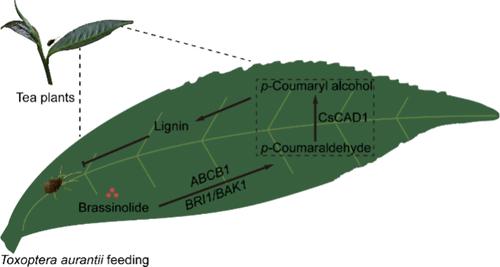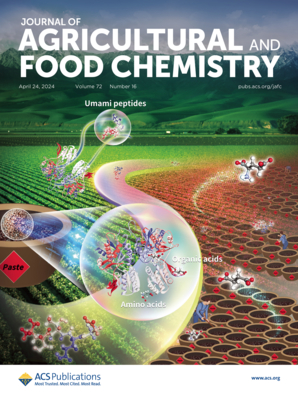综合代谢组学和转录组学分析揭示茶树对毒蛾的防御反应
IF 6.2
1区 农林科学
Q1 AGRICULTURE, MULTIDISCIPLINARY
引用次数: 0
摘要
茶树(Camellia sinensis)是世界上一种独特的饮料作物,但其产量和质量却受到毒翅目茶树(Toxoptera aurantii)的不利影响。然而,茶树对 T. aurantii 胁迫的响应机制仍然知之甚少。在本文中,我们展示了T. aurantii在抗性茶树(W016)和易感茶树(HJY)上的生命表,表明T. aurantii在W016上的适应性低于在HJY上的适应性。综合代谢和转录组分析表明,T. aurantii的取食激活了与苯丙类生物合成、植物激素信号转导和ATP结合盒(ABC)转运体相关的途径。值得注意的是,饲喂 T. aurantii 能显著提高 W016 中黄铜内酯和对迷迭香醇的水平,而不是 HJY 中的水平。此外,体外酶分析表明,C. sinensis 肉桂醇脱氢酶(CsCAD1)催化对香豆内酯的形成,参与木质素的合成。我们的研究结果突显了茶树在应对 T. aurantii 摄食过程中由黄铜内酯介导的木质素生物合成所起的作用。本文章由计算机程序翻译,如有差异,请以英文原文为准。

Integrated Metabolomic and Transcriptomic Profiling Reveals the Defense Response of Tea Plants (Camellia sinensis) to Toxoptera aurantii
The tea plant (Camellia sinensis) is a unique beverage crop worldwide, but its yield and quality are adversely affected by Toxoptera aurantii. However, the response mechanisms of tea plants to T. aurantii stress remain poorly known. Herein, we present the life table of T. aurantii on resistant (W016) and susceptible (HJY) tea cultivars, demonstrating that the fitness of T. aurantii on W016 was lower than that on HJY. Integrated metabolic and transcriptomic analyses revealed that T. aurantii feeding activated pathways associated with phenylpropanoid biosynthesis, plant hormone signal transduction, and ATP-binding cassette (ABC) transporters. Notably, T. aurantii feeding significantly upregulated the levels of brassinolide and p-coumaryl alcohol in W016 but not in HJY. Furthermore, in vitro enzymatic assays indicated that C. sinensis cinnamyl alcohol dehydrogenase (CsCAD1) catalyzes the formation of p-coumaryl alcohol participation in lignin synthesis. Our findings highlight the role of brassinolide-mediated lignin biosynthesis of the tea plant in response to T. aurantii feeding.
求助全文
通过发布文献求助,成功后即可免费获取论文全文。
去求助
来源期刊
CiteScore
9.90
自引率
8.20%
发文量
1375
审稿时长
2.3 months
期刊介绍:
The Journal of Agricultural and Food Chemistry publishes high-quality, cutting edge original research representing complete studies and research advances dealing with the chemistry and biochemistry of agriculture and food. The Journal also encourages papers with chemistry and/or biochemistry as a major component combined with biological/sensory/nutritional/toxicological evaluation related to agriculture and/or food.

 求助内容:
求助内容: 应助结果提醒方式:
应助结果提醒方式:


